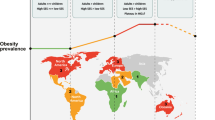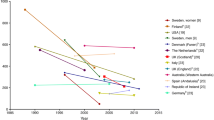Abstract
Purpose of Review
Non-communicable diseases (NCDs), including cardiovascular disease (CVD), are the leading causes of morbidity and mortality in the Caribbean. In response to this growing epidemic, regional and global organizations mandated the collection of real-time and accurate population health data to address surveillance health data gaps. The purpose of this review was to assess surveillance activities implemented in the Caribbean region from 2006 to 2016 and the availability of widely disseminated CVD surveillance data.
Recent Findings
A review of surveillance activities in the region in 2011 showed modest progress in compliance with NCD-related mandates. Our study found that few (12%) countries implemented surveillance surveys yearly and 39% implemented surveys two or more times during 2006–2016. Sixty-four percent of countries included in our review collected data on the six recommended CVD risk factors.
Summary
Future efforts to generate consistent and timely surveillance data may require collaborative approaches to implement, interpret, and translate surveillance data.

Similar content being viewed by others
References
Papers of particular interest, published recently, have been highlighted as: • Of importance •• Of major importance
World Health Organization. Noncommunicable diseases fact sheet in: fact sheets. World Health Organization. 2015. http://www.who.int/mediacentre/factsheets/fs355/en/. Accessed April 21, 2016 2016.
Alwan A. 2008–2013 Action Plan for the Global Strategy for the Prevention and Control of Noncommunicable Diseases. 2009 ed. World Health Organization Report Geneva, Switzerland: World Health Organization; 2009.
•• CARICOM Secretariat. Nassau Declaration on Health 2001: The health of the region is the wealth of the region Georgetown, Guyana. 2001. The Nassau Declaration on Health 2001 acknowledged, for the first time, the importance of population health to regional economic development. This declaration represents the region’s first call for strategic planning for the prevention and control of non-communicable diseases and stated commitment to improving the health of Caribbean populations.
• Pan American Health Organization CCSC. Report of the Caribbean Commission on Health and Development. Kingston, Jamaica: PAHO, CARICOM; 2006. The Report of the Caribbean Commission on Health and Development provides a summary of the health of Caribbean populations and economic growth and development in the region. This report presents trends and prevalence estimates of major causes of diseases and related risk factors, including cardiovascular disease, and potential solutions to address the growing disease burden.
Pan American Health Organization. United Nations high-level meeting on noncommunicable disease prevention and control. New York, USA: World Health Organization; 2011 19–20.
• Hospedales CJ, Barcelo A, Luciani S, Legetic B, Ordunez P, Blanco A. NCD prevention and control in Latin America and the Caribbean: a regional approach to policy and program development. Global Heart. 2012;7(1):73–81. This article presents highlights of progress for the implementation of regional strategies to reduce non-communicable diseases. It describes the Pan-American Health Organization’s role in helping to strengthen surveillance and capacity to achieve chronic disease reduction goals in the Caribbean region.
Peña MSB, Abdala CVM, Silva LC, Ordúñez P. Usefulness for surveillance of hypertension prevalence studies in Latin America and the Caribbean: the past 10 years. Rev Panamericana Salud Públ. 2012;32(1):15–21.
Minimum, optimum and optional data set for chronic non-communicable diseases, violence and injuries sect. 2008;3.
Demographic and Health Surveys (DHS). Dominican Republic Standard DHS In: USAID, editor. Rockville, USA: The DHS Program; 2013.
Demographic and Health Surveys (DHS). Haiti Standard DHS. In: USAID, editor. Rockville, USA: The DHS Program; 2012.
Tull ES, Thurland A, LaPorte RE. Metabolic syndrome among Caribbean-born persons living in the US Virgin Islands. Rev Panamericana Salud Públ. 2005;18(6):418–26.
• Samuels T, Kirton J, Guebert J. Monitoring compliance with high-level commitments in health: the case of the CARICOM Summit on Chronic Non-Communicable Diseases. Bull World Health Organ. 2014;92(4):270–6B. This article highlights CARICOM nations’ compliance with recommendations for increased non-communicable disease surveillance and activities aimed to reduce disease burden in the Caribbean region.
Healthy Caribbean Coalition. A civil society regional status report: responses to NCDs in the Caribbean community. 2014.
Cunningham-Myrie C, Reid M, Forrester T. A comparative study of the quality and availability of health information used to facilitate cost burden analysis of diabetes and hypertension in the Caribbean. West Indian Med J. 2008;57(4):383–92.
Pan American Health Organization. Regional strategy and plan of action on an integrated approach to the prevention and control of chronic diseases, including diet, physical acitivity and health. Washington DC. Pan American Health Organization EU; 2006.
Rose AM, Hambleton IR, Jeyaseelan SM, Howitt C, Harewood R, Campbell J, et al. Establishing national noncommunicable disease surveillance in a developing country: a model for small island nations. Rev Panamericana Salud Públ. 2016;39(2):76–85.
COHRED Group, Council on Health Research for Development,, Global Forum for Health Research, , editor. Priorities for research for health and innovation. 2nd Latin American Conference on Research and Innovation for Health; 2011 23–25 November, 2011; Panama City, Panama. Panama City, Panama COHRED. 2011.
Caribbean Health Research Council. Advanced Monitoring and Evaluation Workshop Manual Kingston, Jamaica: Caribbean Public Health Agency (CARPHA); 2012.
Jahangir E, Comandé D, Rubinstein A. Cardiovascular disease research in Latin America: a comparative bibliometric analysis. World J Cardiol. 2011;3(12):383–7.
Barreto SM, Miranda JJ, Figueroa JP, Schmidt MI, Munoz S, Kuri-Morales PP, et al. Epidemiology in Latin America and the Caribbean: current situation and challenges. Int J Epidemiol. 2012;41(2):557–71.
World Health Organization. NCD global monitoring framework—ensuring progress on noncommunicable diseases in countries in: noncommunicable diseases and mental health. WHO Press, Geneva, Switzerland; 2011. http://www.who.int/nmh/global_monitoring_framework/en/. Accessed July 25, 2016 2016.
Acknowledgements
This publication was made possible by the Yale CTSA grant UL1TR000142 from the National Center for Advancing Translational Science (NCATS), NIH, Yale School of Medicine, and the National Institute on Minority Health and Health Disparities through the Eastern Caribbean Health Outcomes Research Network (ECHORN)--U24MD006939.
Author information
Authors and Affiliations
Corresponding author
Ethics declarations
Conflict of Interest
Drs Oladele, Thompson, Zhang, and Nunez-Smith declare that this publication was made possible by the Yale CTSA grant UL1TR000142 from the National Center for Advancing Translational Science (NCATS), NIH, Yale School of Medicine, and the National Institute on Minority Health and Health Disparities through the Eastern Caribbean Health Outcomes Research Network (ECHORN)--U24MD006939.
TBD have no conflicts of interests.
Human and Animal Rights and Informed Consent
This article does not contain any studies with human or animal subjects performed by the author.
Additional information
This article is part of the Topical Collection on Race and Ethnic Disparities
Rights and permissions
About this article
Cite this article
Oladele, C., Thompson, TA., Zhang, E.R. et al. Population-Based Surveillance for Cardiovascular Disease in the Caribbean: Challenges and Opportunities for Regional Approaches. Curr Cardiovasc Risk Rep 11, 4 (2017). https://doi.org/10.1007/s12170-017-0529-6
Published:
DOI: https://doi.org/10.1007/s12170-017-0529-6




